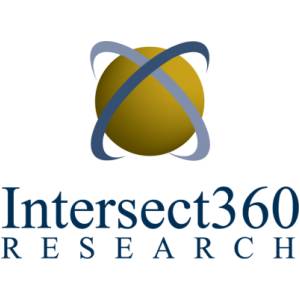Industry analyst firm Intersect360 has released partial results from an HPC end-user survey identifying the top user-rated processors, servers and cloud vendors. The key finding, according firm CEO Addison Snell: the disconnect between the HPC users, who want integration of Nvidia GPUs with CPUs from Intel or AMD, over against HPC vendors developing their own integrated solutions (more on this below).
The top user-rated vendors according to the survey results are:
Highest Level of Product Awareness
Processors: Intel Xeon CPUs
Servers: Dell EMC
Storage: Dell EMC
Cloud: Amazon Web Services
Highest Level of Current Usage
Processors: Intel Xeon CPUs
Servers: Dell EMC
Storage: Dell EMC
Cloud: Amazon Web Services
Highest-Rated, Technical Impression
Processors: Nvidia GPUs
Servers: Cray
Storage: DDN
Cloud: Amazon Web Services
Highest-Rated, Operational Impression
Processors: Intel Xeon CPUs
Servers: Cray
Storage: DDN
Cloud: Amazon Web Services
Highest-rated, Overall *
Processors: Nvidia GPUs
Servers: Cray
Storage: DDN
Cloud: Amazon Web Services
Highest-Rated, Future Outlook for HPC
Processors: Nvidia GPUs
Servers: HPE (including Cray)
Storage: DDN
Cloud: Amazon Web Services
Highest-Rated, Likeliness to Use in Two Years
Processors: Intel Xeon CPUs
Servers: Dell EMC
Storage: Dell EMC
Cloud: Amazon Web Services
Greatest Level of Vendor Product Loyalty, Based on Ratings *
Processors: AMD EPYC CPUs
Servers: Inspur
Storage: Qumulo
Cloud: Amazon Web Services
Greatest Projected Adoption by Non-Current Customers, Based on Ratings *
Processors: AMD EPYC CPUs
Servers: HPE (including Cray)
Storage: DDN
Cloud: Amazon Web Services
Greatest Projected Market Share Gain, Based on Ratings *
Processors: AMD EPYC CPUs
Servers: Atos (Bull)
Storage: WekaIO
Cloud: Microsoft Azure
Snell said the study results make clear that Intel Xeon CPUs are still dominant in the HPC processor market, but also that AMD EPYC CPUs are highly thought of and are gaining in both mindshare and market share. Nvidia GPUs top the ratings in technical evaluation. The combination poised to gain the most, according to the user ratings, is AMD with EPYC CPUs plus Radeon GPUs.
“What users are really saying they want are Nvidia GPUs together with either Intel Xeon or AMD EPYC CPUs,” said Snell, “but that’s not the way the market is heading, as each company is building its own integrated solutions.”
By this Snell refers to chip makers purchasing or developing processors that will expand their offerings.
“The highest rated processing elements across the study tend to be Nvidia GPUs, Intel CPUs and AMD CPUs,” he said. “And then if you go to other things like Arm CPUs or Intel GPUs, or AMD GPUs, they’re further down. The implication being that what a lot of HPC users would want to have going forward is Nvidia GPUs together with either Intel or AMD CPUs for HPC. Now separate from that each of those three vendors is really pursuing integrated solutions Nvidia has acquired Arm, and Intel and AMD each have their own GPUs — AMD’s already in the market and Intel with one forthcoming.”
Could this point toward a strategy in which the chip makers integrate their processors with only their own processors?
“Intel, AMD, they both see a path toward integrating the accelerator,” Snell said. “Nvidia, in defense, is getting closer to another CPU with Arm to avoid x86 entirely. Which isn’t to say that people can’t mix those processors now. They can, they can next year, they probably can in two years. But what about in four years? Tough to say.”
In fact the possibility exists that the chip makers may at some point come into conflict with their server customers, such as Dell EMC, HPE, Lenovo, Inspur and others, that have developed CPU-GPU platforms.
“I think that likely is the case with Nvidia out of all of them,” Snell said. “Nvidia has done the most recently in terms of integrated systems with the DGX reference architecture and Superpod that potentially puts Nvidia into the dangerous position of being in competition with their own customers. Right now, platforms are really a little more aligned toward AI than they are toward general HPC because (of their) eight to one GPU to CPU ratio. But still, with the acquisition of Arm I think Nvidia is looking more and more like they want to pursue more of an integrated play.”
While Intersect360 declined to release additional survey detail about where other vendors placed within the various categories, he told us that “a few of the categories were very close at the top. Both Inspur and Atos had outstanding loyalty scores among current users in the server category. DDN and Dell EMC were nearly deadlocked in operational impression for storage. Which of the cloud vendors has the best future outlook for HPC comes down to weighting schemes; Microsoft Azure and GCP are both also very strong.”
Snell said the full study, entitled HPC User Ratings Survey: Awareness, Satisfaction, Loyalty Across Processors, Servers, Storage, Cloud and available at the firm’s web site, gives user ratings of prominent vendors in major categories, such as awareness, technical impressions, operational impressions and likeliness to buy in the future.

Addison Snell, Intersect360 Research
He added, “As we have said in our other research, HPE is clearly benefiting from its acquisition of Cray. Even so, Dell EMC is a strong competitor, and the two companies will continue to battle for market share supremacy. Companies like Atos and Inspur do very well in their local markets.
“In storage, we see the strong presence and solid evaluation of Dell EMC together with appreciation for the performance and scalability of DDN, locked together at the top of the ratings. Smaller companies like WekaIO, Qumulo, and VAST Data do well among their current users and are projected by users to gain.”
Confirming the trend shown in previous Intersect360 reports, cloud computing has a clear top three, with Amazon Web Services, Microsoft Azure, and Google Cloud dominating the ratings. “AWS nearly sweeps the categories at the top of user ratings,” said Snell. “Google Cloud is right next to AWS in loyalty, and Microsoft Azure is showing the highest-rated growth possibilities. Alibaba Cloud scores well among a local group but has little awareness or usage outside that.”
The vendors included in the study were as follows. Processors: AMD EPYC CPUs, AMD Radeon GPUs, Fujitsu A64fx ARM CPUs, Intel Xeon CPUs, Intel all other (FPGAs, GPUs, neural, etc.), IBM POWER CPUs, Marvell ThunderX1/X2/X3 ARM CPUs, NVIDIA GPUs for HPC and AI. Servers: Atos (Bull), Cray, Dell EMC, Fujitsu, HPE, Huawei, IBM, Inspur, Lenovo, Penguin Computing, Supermicro. (For future looking questions on servers, HPE and Cray were combined.) Storage: DDN, Dell EMC, HPE, IBM, Netapp, Panasas, Quantum, Qumulo, VAST Data, WekaIO. Cloud: Alibaba Cloud, Amazon Web Services (AWS), Google Cloud Platform (GCP), IBM Cloud, Microsoft Azure, Nimbix, Oracle Cloud Infrastructure (OCI), Penguin On-Demand (POD), R Systems, Rescale, UberCloud.
Snell said the firm used an online survey with email invitations to HPC users. The final analysis includes 194 qualified HPC users from 30 countries.
“This is the first time we have done the study in this form,” Snell told us. “Four years ago we asked some similar questions about processors in a deep-dive study about processor element transitions. AMD CPUs have gained dramatically since that time and now exceed Intel Xeon CPUs in ‘future outlook,’ as rated by HPC users.”




